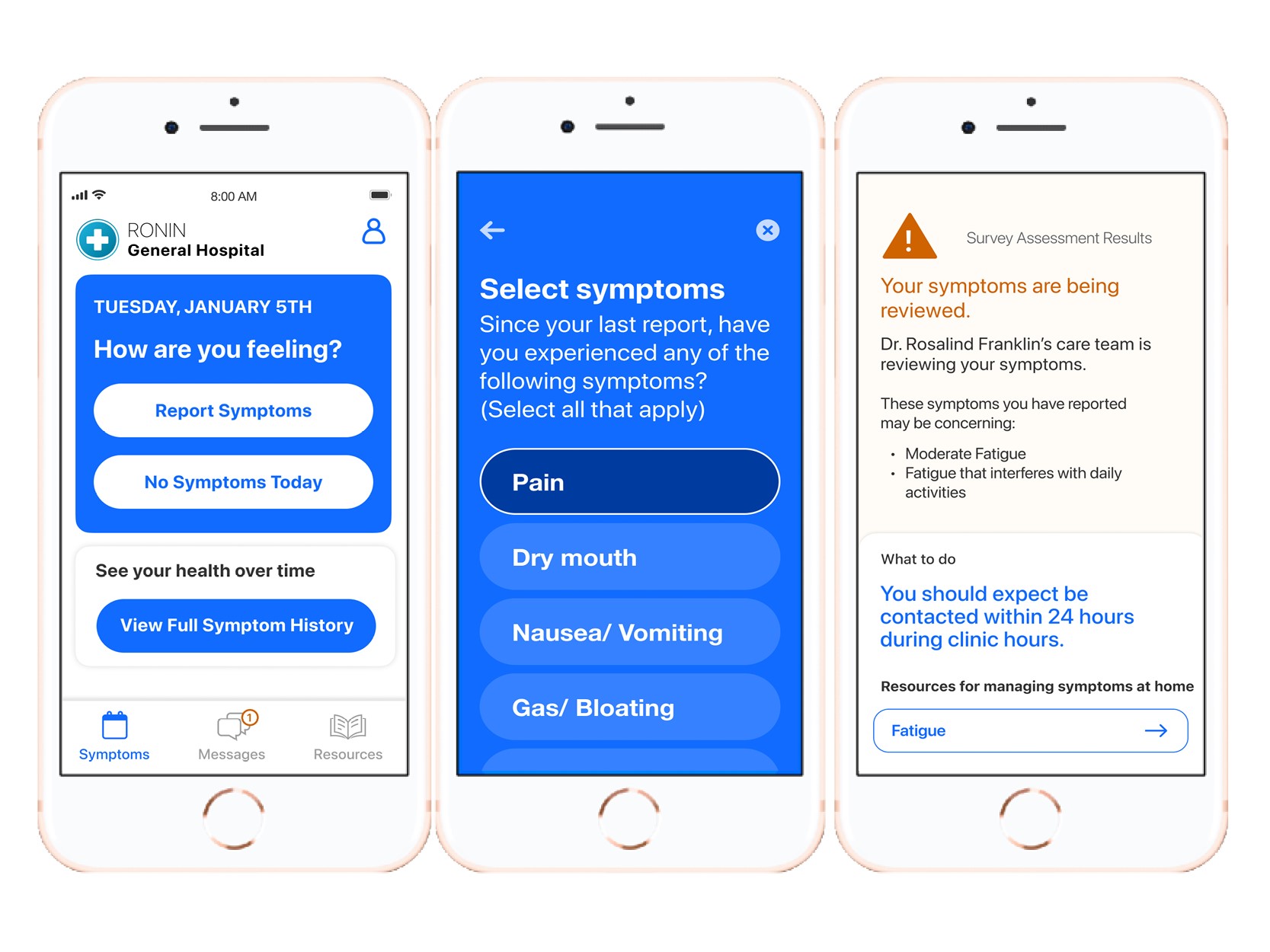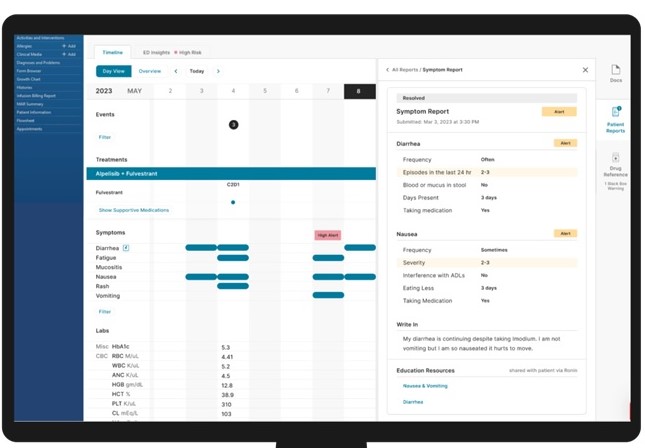 In October 2022, Providence Saint John's Health Center invested in Project Ronin, an AI driven cancer intelligence platform to empower cancer patients and their clinical teams to manage treatment symptoms, care communications and clinical decision support. Their goal is to reduce ED visits and deliver better patient care and outcomes.
In October 2022, Providence Saint John's Health Center invested in Project Ronin, an AI driven cancer intelligence platform to empower cancer patients and their clinical teams to manage treatment symptoms, care communications and clinical decision support. Their goal is to reduce ED visits and deliver better patient care and outcomes.
According to the American Cancer Society’s 2023 Cancer Statistics report, cancer remains the second highest cause of death after heart disease. This is an estimated 2 million newly diagnosed cancer cases resulting in about 610,000 deaths.
Dr. Martin, MD, CMO of Providence Saint John’s believes that providing a new “space where cancer people can engage with their physicians has some very real, tangible benefits.” The digital tool is designed to support “patients with less-critical symptoms, which has the potential to reduce emergency department visits and improve clinical efficiency, which means a more efficient utilization of resources. Of course, we always advocate patients to come to the emergency department if they believe they are experiencing a medical emergency.”
Cancer Care Collaboration
Successful treatment of cancer is multifaceted, requires a multi-disciplinary care team, entails managing different data sets with continuous capture and monitoring of data, and has data complexity given the non-linear nature of the disease (i.e. diagnosis, treatment, remission, recurrence, treatment, survivorship/death).
Patients struggle to manage their cancer, both mentally and physically. Patient treatment symptoms can be severe. Questions come up between treatments but care teams are extremely busy. Patients need to remain connected to care teams to stay engaged, better manage, and communicate side effects.
Providers try to navigate their inefficient clinical workflows, address the administrative burden due to documentation requirements, and deal with workforce shortages. Today, providers spend 20-40 minutes finding patient info to prepare for patient visits, sometimes missing key data. Providers are overwhelmed to make needed decisions for cancer patients at the point of care.
AI Cancer Platform Delivers Care & Decision Support
The Ronin Cancer Platform enables patients to “take control of their care in a way that wasn't possible before and feel better connected to their care teams,” explains Dr. Neil Martin, MD, CMO of Providence Southern California Clinical Institutes and Executive Director of Saint John's Cancer Institute. Clinicians utilize this cancer intelligence platform’s predictive analytics and clinical dashboard to define treatment pathways and support more informed care decisions.
How does this work? The Ronin cancer platform takes structured and unstructured data from different EHR silos, and then cleans, calibrates, contextualizes this information to present care insights. With predictive analytics, providers can identify at-risk patients and see a complete real-time view of the care journey for immediate actions.
AI Data- Driven Cancer Platform: Patient Experience

Patient Patricia (patient persona), 74 years old, is newly diagnosed with breast cancer. While meeting with her new care team, Patricia learns about new resources including the free Ronin Symptom Monitoring App, to educate and support her as she navigates her cancer path. During her next appointment, Patricia notices the poster in her doctor’s office prompting her to download this patient app.
Patient Symptom Monitoring App Poster:
We want to support you through your treatment. In between your visits, please let us know how you're feeling by using the Ronin Symptom Monitoring Application. This will help us catch any side effects that you may experience. Studies show that symptom monitoring can ...
• Help people live longer and improve their quality of life
• Help people stay on treatment longer
• Lower visits to the emergency room and reduce hospital stay
Patricia downloads and begins using the Symptom Monitoring app which captures her Patient Reported Outcomes (PROs), enables her to track and manage side effects for treatment tolerance, displays her symptom history and provides her with personalized education based on what she is reporting. Within the app, Patricia selects from a list of symptoms and then sees a message that her symptoms “are concerning”, that her care team is monitoring this and will reach out to her within 24 hours.
AI Data-Driven Cancer Platform: Provider Experience

Patricia’s care team receives a “symptom alert” through the EHR based on the information that she has entered. Her symptom information has required a response (e.g. new symptom, moderate or severe symptom). The Nurse Navigator reaches out electronically or telephonically to check in on Patricia to understand more about her symptoms.
When her Oncologist Dr. Davis initially set up Patricia’s personalized care pathway on the platform, he indicated her specific disease type, which triggered patient reported outcomes surveys and at-risk surveys which captures data and intelligently prioritizes for the care team to take quick action to course correct and preempt adverse events.
While preparing for an upcoming office visit with Patricia, Dr. Davis uses the Ronin Platform to view a longitudinal timeline of her cancer journey, filled with real-time data (e.g. labs, images, pathology, treatment, surgery notes, past encounters) to make informed, proactive and personalized treatment decisions. Following the visit, Dr. Davis (or the clinical staff) pushes educational content to help Patricia to navigate her new symptoms or cancer stages.
AI Driven Care Experience Value Proposition
At Providence Saint John's Health Center, both patients and providers are finding value using the AI Ronin Platform, including clinical efficiencies, better care and outcomes and higher satisfaction. Here are some comments from the patient and provider users:
Patient Experience:
“Ronin provided confidence someone was monitoring me.”
“Ronin made me feel like my care team was with me, even at home.”
“I prefer not having to call the hospital. (With app) I am able to record side-effects right away as they are happening”.
“It’s (app) so easy to open up and write how I’m feeling…It’s a great reminder to me that even though I may think I’m fine, I need to pay attention to my symptoms.”
Provider/Staff Experience:
“We were able to catch an immune- related toxicity early for a patient of mine. Without Ronin, I would not have caught it”. Medical Oncologist
“We want to make sure the patients are having the best quality of life. With Ronin, we can check in on them more frequently.” Nurse Navigator
“From the treatment team’s standpoint, it’s made it easy to follow patients. It’s a great way to stay hands-on.” Nurse Navigator
“I had a patient straight up tell me ‘If it wasn’t for the app, I would be calling you guys every day'.” Medical Oncologist
“Visually, the Timeline tab makes it much easier to get up to speed on a patient. Especially compared to reading my colleague’s last notes.” Medical Oncologist
Success Metrics
In addition to gathering qualitative comments about the patient and provider/staff experience, Providence Saint John’s tracks quantitative success metrics for the AI driven Cancer Program. Some key metrics include:
● Reduced unnecessary ED admissions by >20% (early findings)
● Improved efficiencies with 35% decreased patient call volume and 32% patient-initiated messages.
● Strong patient satisfaction & experience
- 84% see positive impact on care experience
- 90% say app is easy to use
- 88% are satisfied with solution
Future for Providence with Ronin Cancer Platform
Moving beyond the patient mobile app and care communication from phase one, Providence Saint John's is planning to provide clinical decision support with oncology and risk dashboards and the capability to view comparative patient analytics in phase two.
"We are proud to implement evidence-based care solutions for patients in our community," said Brad Bott, Executive Director of the Southern California Clinical Institutes. "Our partnership with Ronin will help improve cancer care delivery while empowering our staff to practice more efficiently. It's a win-win."